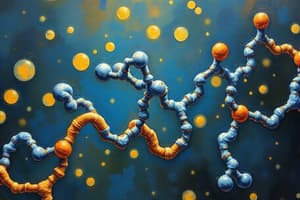Podcast
Questions and Answers
Which biomacromolecule primarily serves as an energy source and has roles in structure and signalling?
Which biomacromolecule primarily serves as an energy source and has roles in structure and signalling?
- Lipids
- Carbohydrates (correct)
- Nucleic Acids
- Proteins
What is a key function of lipids as biomacromolecules?
What is a key function of lipids as biomacromolecules?
- Carrying genetic information
- Energy storage (correct)
- Catalyzing biochemical reactions
- Transporting molecules across cell membranes
Which biomacromolecule is primarily involved in the regulation and signalling within biological systems?
Which biomacromolecule is primarily involved in the regulation and signalling within biological systems?
- Carbohydrates
- Lipids
- Proteins (correct)
- Nucleic Acids
What role do nucleic acids primarily fulfill in biological systems?
What role do nucleic acids primarily fulfill in biological systems?
Which of the following best describes the relationships among the biomacromolecules?
Which of the following best describes the relationships among the biomacromolecules?
What type of metabolic pathway converts simple precursors into complex end products?
What type of metabolic pathway converts simple precursors into complex end products?
Which of the following best describes catabolic pathways?
Which of the following best describes catabolic pathways?
Metabolic pathways that serve as junctions between anabolic and catabolic processes are known as what?
Metabolic pathways that serve as junctions between anabolic and catabolic processes are known as what?
What defines endergonic reactions within metabolic pathways?
What defines endergonic reactions within metabolic pathways?
Which of the following is a primary focus of biochemistry concerning metabolism?
Which of the following is a primary focus of biochemistry concerning metabolism?
What should a student do if they want their exam paper re-evaluated?
What should a student do if they want their exam paper re-evaluated?
Why was the student’s request for an extra point denied?
Why was the student’s request for an extra point denied?
Can the grading chart be changed after exams have been conducted?
Can the grading chart be changed after exams have been conducted?
What information is not provided directly to students by the instructor?
What information is not provided directly to students by the instructor?
What is the consequence of requesting a change in letter grades post-exam?
What is the consequence of requesting a change in letter grades post-exam?
What type of assessment does the course primarily utilize?
What type of assessment does the course primarily utilize?
How should students communicate officially with the instructor?
How should students communicate officially with the instructor?
What is the general approach towards additional points or extra credit?
What is the general approach towards additional points or extra credit?
Flashcards
Re-evaluation request
Re-evaluation request
Formal request for a review of a grade. Usually submitted through the designated Faculty channels
Extra points
Extra points
Additional points beyond the already defined grading system.
Grade changes
Grade changes
Modifying an existing grade after evaluation of scores has been done
Contacting Instructor
Contacting Instructor
Signup and view all the flashcards
Exam content
Exam content
Signup and view all the flashcards
Passing grade
Passing grade
Signup and view all the flashcards
Recommended resources
Recommended resources
Signup and view all the flashcards
Instructor contact
Instructor contact
Signup and view all the flashcards
Metabolism
Metabolism
Signup and view all the flashcards
Anabolic Pathway
Anabolic Pathway
Signup and view all the flashcards
Catabolic Pathway
Catabolic Pathway
Signup and view all the flashcards
Amphibolic Pathway
Amphibolic Pathway
Signup and view all the flashcards
Biochemistry
Biochemistry
Signup and view all the flashcards
Citric acid cycle
Citric acid cycle
Signup and view all the flashcards
Biomacromolecules
Biomacromolecules
Signup and view all the flashcards
Energy storage
Energy storage
Signup and view all the flashcards
Study Notes
Course Information
- Course: Introduction to Biochemistry (HSF101)
- Instructor: Caner Geyik, PhD
- Email: [email protected]
- Year: 2024
Course Content
- Week 1 (11/10/2024): Course Introduction - Basics Principles of Biochemistry
- Week 2 (18/10/2024): Water, Acids-Bases, and Buffer Systems
- Week 3 (25/10/2024): Amino Acids and Protein Structure
- Week 4 (01/11/2024): Protein Classification and Function
- Week 5 (08/11/2024): Blood Proteins and Clinical Importance
- Week 6 (15/11/2024): Enzymes
- Week 7 (22/11/2024): Overview and Q&A Session
- Week 8 (23/11/2024 - 01/12/2024): Midterm Exam Week
- Week 9 (06/12/2024): Carbohydrates
- Week 10 (13/12/2024): Bioenergetics and Carbohydrate Metabolism
- Week 11 (20/12/2024): Lipids
- Week 12 (27/12/2024): Metabolism of Nitrogenous Compounds
- Week 13 (03/01/2025): Signaling Pathways and Regulation of Metabolism (Fed/Hunger States)
- Week 14 (10/01/2025): Overview and Q&A Session, Final Exams
Assessment
- Midterm Exam: 40%
- Final Exam: 60%
- Exams include multiple-choice, true-false, and open-ended questions
Learning Outcomes
- Describe metabolism
- List biomacromolecules
Chemistry of Living
- Which molecules form us?
- How are these molecules formed?
- Who determines the reactions and when they happen?
- How do we obtain energy?
- What happens if there's a problem?
- How can metabolic problems be treated?
Topics in Biochemistry
- Metabolism
- Enzymology
- Nutrition
- Diseases
- Structural Biology
Metabolic Pathways
- Anabolic: From simple precursors to complex end products (e.g., Glucose → Glycogen, Amino acids → Protein)
- Catabolic: From complex molecules to simple molecules (e.g., Glycogen → Glucose, Protein → Amino acids)
- Amphibolic: Crossroads of metabolism; links anabolic and catabolic pathways (e.g., Citric acid cycle)
Biomacromolecules
- Proteins
- Carbohydrates
- Lipids
- Nucleic Acids
Additional Notes
- The syllabus is the primary source of information.
- Students should ask questions in the Q&A forum, not directly to the instructor. Re-evaluation requests need to follow university protocols.
- Read the syllabus for details on grading, policies, and all other details.
Studying That Suits You
Use AI to generate personalized quizzes and flashcards to suit your learning preferences.



